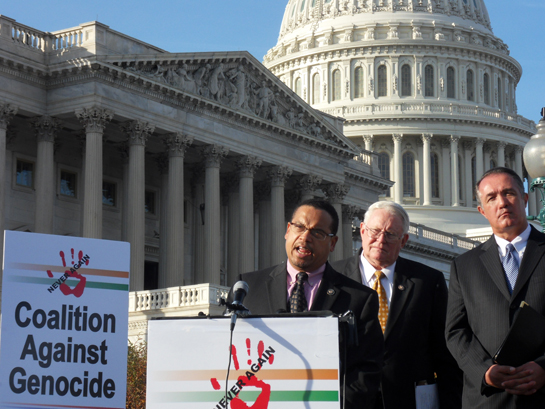 Congressman Keith Ellison (D-MN) addresses the press conference organized by the Coalition Against Genocide. Other members of Congress who participated included Representatives Joe Pitts (D-PA), Frank Rudolph Wolf (R-VA), Trent Franks (R-AZ). Photo by Colin Christopher.
Congressman Keith Ellison (D-MN) addresses the press conference organized by the Coalition Against Genocide. Other members of Congress who participated included Representatives Joe Pitts (D-PA), Frank Rudolph Wolf (R-VA), Trent Franks (R-AZ). Photo by Colin Christopher.
A s Congressional leaders and the White House continue to spar over revenue and tax policy measures aimed at avoiding the "fiscal cliff," a Tuesday, December 4, 2012 afternoon press conference on Capitol Hill provided a rare moment of bi-partisan solidarity.
Organized by the Coalition Against Genocide and supported by both Democratic and Republican members of the United States House of Representatives, family members of victims from the 2002 communal riots in Gujarat, India voiced their strong support of a Congressional letter asking U.S. Secretary of State Hilary Rodham Clinton to continue to deny Gujarat's Chief Minister Narendra Modi's U.S. visa privileges.
"It is heartening ... that Congress persons on both sides of the aisle have come together to issue a strong statement that is not only an expression of solidarity with the victims, but also a reaffirmation of our common shared values of justice, human rights, and freedom of religion. Denying a visa to Mr. Modi will prevent a culture of impunity from taking hold among Human rights abusers no matter where they are," said Dr. Hyder Khan, member of the Coalition Against Genocide.
Mr. Modi, who continues to serve as the Chief Minister of Gujarat, is accused by the Indian Human Rights Commission (NHRC) as being complicit in the Gujarat Riots of 2002, killing over 1,000 people, most of them Muslims. A 75-page Human Rights Watch report from 2002 concluded that the attacks were "planned in advance and organized with extensive participation of the police and state government officials."
House Representative Joe R. Pitts (R-PA), one of twenty-five members of Congress to sign the letter addressed to Secretary Clinton, traveled to the state of Gujarat in the immediate aftermath of the riots in 2002. "The officials in Gujarat Province, we asked them, 'why didn't the police respond to what was occurring,' and the police said that we [they] had no order to respond," Pitts recalled.
Also at Tuesday's press conference, Nishrin Hussain, daughter of slain Indian Parliamentarian Ahsan Jafri, recounted Mr. Modi's response to her father's panicked plea for help over a phone call to him during the middle of the riots. Hussain told the press that Mr. Modi replied, "Jafri, save yourself if you can." Supporting her conviction for Mr. Modi's complicity in her father's murder, Hussain noted, "...there was nobody. The biggest hospital in Asia is about a mile away. Not even a single ambulance came."
Despite a wealth of evidence against Mr. Modi's involvement in allowing the killings to take place, he has been acquitted of all prosecutions and remains as one of the most popular leaders in all of India.
Eyeing a chance to become India's next Prime Minister, Mr. Modi has hired top public relations firms to clear his name, and continues to meet with international leaders and business investors eager to capitalize on Gujarat's booming economy, which broke 10% growth last quarter.
In October of this year, British officials cleared the way for Mr. Modi to visit the U.K. after a decade-long travel ban on all Gujarati Government officials. Top British officials have courted Mr. Modi, citing Gujarat's strong cultural influence and economic ties to Britain as reasoning for the policy shift.
International human rights advocates and many governments were outraged by Britain's move, and worried that the United States might follow suit. However, widespread Congressional support of previous administrations’ efforts to block Modi in 2005 and 2008, and sustained support for such measures currently within Congress, suggest the ban will continue under Mrs. Clinton. (In 2005 and 2008, the State Department cited provisions from the International Religious Freedom Act, which makes any foreign government official who "was responsible for or directly carried out, at any time, particularly severe violations of religious freedom" ineligible for a visa.)
Tuesday's press conference on Capitol Hill was seen by many as a direct response to Britain's shift, and an effort to strengthen the firewall behind the ban on Mr. Modi's U.S. travel privileges.
Mr. Modi, has welcomed the British invitation and used the opportunity to shore up further financial and political support for his likely bid to run for Prime Minister. Although his popularity remains strong within India, Mr. Modi faces formidable competition for the top position from within the ranks of his own party, the Bharatiya Janata Party (BJP).
In addition to preventing Mr. Modi from entering the U.S., members of the Coalition Against Genocide and their allies hope their message influences Indian public opinion as well.
"The violation of human rights and religious freedom under Mr. Modi's watch did not end after the pogrom of 2002. They continue in the form of extradition killings, economic discrimination, lack of due process in the enforcement of law, as well denial of reparation for the victims of Gujarat 2002." Mr. Khan said.
"During the last 10 years, Mr. Modi's administration has enacted or engaged in systematic persecution of religious minorities." Mr. Modi's 2003 law, the Gujarat Freedom of Religion Act, prevents Gujaratis from converting or adopting a new religion by imposing difficult pre-conditions, such as "obtaining a permission or approval of a city magistrate," and is targeted at affecting religious minorities such as Christians and Muslims.
House Representative Keith Ellison (D-MN), a strong advocate of interfaith cooperation and human rights in the House of Representatives, said, "We all have the right to tell each other, 'stand up for what's right no matter what.''"









Comments powered by CComment